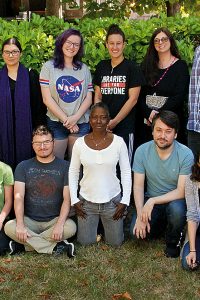Charles Stross: Contrarian
 Charles Stross’s first professional story sale, ‘‘The Boys”, appeared in 1986, and he has published short fiction regularly ever since. Novelette ‘‘Lobsters” (2001) was nominated for a Nebula and Hugo, and was runner-up for the Sturgeon Award; novelette ‘‘Halo” (2002) was a Hugo and Sturgeon nominee; ‘‘Router” (2002) was shortlisted for a BSFA award; novelette ‘‘Nightfall” (2003) was a Hugo and BSFA nominee; time-travel novella ‘‘Palimpsest” (2009) won a Hugo; and Laundry story ‘‘Overtime” was a Hugo finalist. Novella Missile Gap was published in 2007. Some of his short fiction has been collected in Toast (2002) and Wireless (2009).Stross collaborated with Cory Doctorow on several short stories, notably ‘‘Jury Service” (2002), sequel ‘‘Appeals Court” (2004) (later published together as ‘‘The Rapture of the Nerds”), and ‘‘Flowers from Alice” (2003). An expanded novel version of The Rapture of the Nerds is forthcoming.
Charles Stross’s first professional story sale, ‘‘The Boys”, appeared in 1986, and he has published short fiction regularly ever since. Novelette ‘‘Lobsters” (2001) was nominated for a Nebula and Hugo, and was runner-up for the Sturgeon Award; novelette ‘‘Halo” (2002) was a Hugo and Sturgeon nominee; ‘‘Router” (2002) was shortlisted for a BSFA award; novelette ‘‘Nightfall” (2003) was a Hugo and BSFA nominee; time-travel novella ‘‘Palimpsest” (2009) won a Hugo; and Laundry story ‘‘Overtime” was a Hugo finalist. Novella Missile Gap was published in 2007. Some of his short fiction has been collected in Toast (2002) and Wireless (2009).Stross collaborated with Cory Doctorow on several short stories, notably ‘‘Jury Service” (2002), sequel ‘‘Appeals Court” (2004) (later published together as ‘‘The Rapture of the Nerds”), and ‘‘Flowers from Alice” (2003). An expanded novel version of The Rapture of the Nerds is forthcoming.
Lovecraftian spy thriller The Atrocity Archive (serialized 2001-02) began the Laundry series, and appeared in hardcover along with Hugo Award-winning novella ‘‘The Concrete Jungle” in 2004, with sequel The Jennifer Morgue following in 2006, and The Fuller Memorandum in 2010. The Apocalypse Codex is forthcoming in 2012.
His first SF novel was the Hugo-nominated far-future space opera Singularity Sky (2003), which led to sequel Iron Sunrise (2004). His ‘‘Accelerando” series of SF stories, which appeared in Asimov’s, beginning with ‘‘Lobsters” in 2001 and ending with ‘‘Elector” in 2004, were adapted into a novel, Accelerando (2005), a Hugo and John W. Campbell Memorial Award finalist.
He began his Merchant Princes series – multiverse SF masquerading as fantasy – with The Family Trade (2004), followed by The Hidden Family (2005), The Clan Corporate (2006), The Merchant’s War (2007), The Revolution Business (2009), and The Trade of Queens (2010). That series is now concluded, though he may return to the milieu in the future.
Far-future SF novel Glasshouse (2006) was a Hugo finalist and winner of the Prometheus Award. Near-future SF novel Halting State (2007) was a Hugo finalist, and was followed by sequel Rule 34 (2011); another sequel, The Lambda Functionary, is expected in 2014. Space opera and Heinlein homage Saturn’s Children (2008) was a Hugo and Prometheus Award nominee, with sequel Neptune’s Brood due out in 2013. Stross recently published one of his early unpublished works, SF novel Scratch Monkey (2011).
He lives in Edinburgh, Scotland with wife Feòrag NicBhride (married 2003).
Site: Charlie’s Diary
I’m currently most of the way through finishing a collaborative novel with Cory Doctorow titled The Rapture of the Nerds. It’s been coming for a while. In 2003 or 2004, one of us suggested collaborating on a story, and I dug into my pile of unfinished stories and pulled out the first 1000 words of an idea and threw it at Cory. He continued with it and we came up with a strange fable about a curmudgeonly Welsh Green environmental activist type who trusts no technology more complex than his bicycle, living in a post-Singularity world. He has volunteered for ‘jury service’ to pass judgment on a random design schemata broadcast from the cloud of transcendent intelligences in orbit. His idea is to spike this new technology, but unfortunately, the cloud has other plans for him.
 ‘‘To our shock this novella, ‘Jury Service’, sold to Sci Fiction. Later we were commissioned to write a sequel novella, and by the end we had 40,000 words of fiction. We had this idea that we’d finish a collaborative novel called The Rapture of the Nerds by writing the final half of the story later – but we were too damn busy. Along the way Tor decided they wanted to acquire the novel if we could ever find time to write it. So for a period of a few years, every year I would e-mail Cory and say,’Do you have any spare time in your calendar this year?’ And he would say, ‘No, how about you?’ ‘No. Okay, same time next year?’ That’s how it went until last year – and I’m afraid to say it’s all your fault.
‘‘To our shock this novella, ‘Jury Service’, sold to Sci Fiction. Later we were commissioned to write a sequel novella, and by the end we had 40,000 words of fiction. We had this idea that we’d finish a collaborative novel called The Rapture of the Nerds by writing the final half of the story later – but we were too damn busy. Along the way Tor decided they wanted to acquire the novel if we could ever find time to write it. So for a period of a few years, every year I would e-mail Cory and say,’Do you have any spare time in your calendar this year?’ And he would say, ‘No, how about you?’ ‘No. Okay, same time next year?’ That’s how it went until last year – and I’m afraid to say it’s all your fault.
‘‘Last year Locus ran an April Fool’s article announcing that Stross & Doctorow had accepted a seven-figure commission to write an authorised sequel to Atlas Shrugged by Ayn Rand. I e-mailed Cory and said, ‘Have you seen this?’ He said, ‘‘Yeah – have you got any time?’ Because, in fact, a creative Objectivist does feature in the second novella, and the ghost of Ayn Rand puts in an appearance towards the end of The Rapture of the Nerds. We haven’t finished writing it, and I shouldn’t say more, because it’s a joint novel, and you’re only interviewing one of us right now.”
…
 “I get contrary. One of the things that has made a big impact on my writing in the past five years was Geoff Ryman and his students’ idea of Mundane SF. A lot of people have misunderstood Mundane SF as being a sort of hair shirt – the ‘We can’t have nice toys’ school of thought in SF. But what Mundane SF is really about is pointing out that, if we’re trying to write SF that extrapolates believably about the future, we’ve gotten lazy. We’ve gotten into the habit of using stock tropes from our central supplies department: things like faster-than-light travel, or time travel, or AI, or alien contact – which are all, to greater or lesser extent, plausible, but which may not actually ever exist. We don’t have those things, we have no direct experience of them, and it may all be impossible. Like it or lump it, having faster-than-light starships or aliens in a novel makes it approximately as credible as having fire-breathing dragons and magic swords.”
“I get contrary. One of the things that has made a big impact on my writing in the past five years was Geoff Ryman and his students’ idea of Mundane SF. A lot of people have misunderstood Mundane SF as being a sort of hair shirt – the ‘We can’t have nice toys’ school of thought in SF. But what Mundane SF is really about is pointing out that, if we’re trying to write SF that extrapolates believably about the future, we’ve gotten lazy. We’ve gotten into the habit of using stock tropes from our central supplies department: things like faster-than-light travel, or time travel, or AI, or alien contact – which are all, to greater or lesser extent, plausible, but which may not actually ever exist. We don’t have those things, we have no direct experience of them, and it may all be impossible. Like it or lump it, having faster-than-light starships or aliens in a novel makes it approximately as credible as having fire-breathing dragons and magic swords.”
…
‘‘Neptune’s Brood is going to be a mundane SF space opera about atomic-powered robot mermaids in space. Why? Because I can. We’re living through the golden age of exo-planetography and I have a yen to write something set on a water world, hence the mermaids. They’re robots because humans don’t adapt to other planets. I also have some interesting ideas about the economics of interstellar colonization that I don’t want to share with you just yet.
‘‘It’s basic worldbuilding. We’ve been to the moon, but we haven’t found an economically valid reason for going to the moon, so we haven’t been back there since Apollo. This does not mean we’re never going back, but it won’t be for the same reasons, and certainly not because it’s someone’s manifest destiny – unless of course it’s the Chinese demonstrating that they are the economic 500-pound gorilla on the block. Or the Indonesians, or whoever comes next.”



 Excerpts from the interview:
Excerpts from the interview:



I note the headline. Most of the obituaries credibly describe Christopher Hitchens as a contrarian, i.e. someone who radically opposes conventional beliefs about almost everything. I cannot see this word ever properly applied to Charles Stross.
Pingback:Co tam w fantastyce słychać? (5 XII – 18 XII 2011) | Zaginiona Biblioteka
Pingback:Geek Media Round-Up: December 22, 2011 – Grasping for the Wind